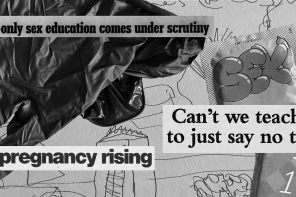Marcela Negro de Leserre, in her essay “El deseo es el deseo del otro. La influencia de Hegel en Lacan”[1], explains a revolutionary idea: if a person only becomes dignified by peers, while all others do not give it, then dignity is not obtained. His/her humanity is other than in himself/herself, because he/she only is in the other, not inside himself/herself. At this point it was obvious that I was feeling like half a person: the ways to experience a hug or a kiss in public became blocked. Recognition was not something I could have. If he gave me recognition, it would mean loosing his own in front of his world. I was dignified on the internet, by phone, on chats, and e-mails. Due to opposite schedules it was difficult to skype, but more often than not we would fall asleep with our computers next to us and the cameras on so we could idiotically pretend that we were together. According to the author, dignity implies a recognition that can only come through if, what in Hegelian lectures has been stated as “desire”, appears. This eventually becomes the drive of an individual to transformation. Desire is transformative: it is the force by which the individual transforms something in order to experience his/her own subjectivity changed by becoming the object that is craved. Throughout desire the individual transforms himself/herself for satisfaction and appreciation of others. The person needs recognition from others. To be recognized by another requires a condition: my desire (my potential transformation) is the desire of that one who will recognize me as a human being. Only by equivalent mutual desire can individuals understand each other as such. To desire implies denying the self-given, transforming it and recognizing it, and while recognizing individuals gives them dignity, to others the desire becomes recognition. Our bodies were never denied, but the mechanism in the relationship became a more particular one: our bodies were dismantled and readapted in a virtual world. My desire became his only in the intimacy of Gmail. Only there could recognition and dignity be reasonable. Following the logic of “denial-transformation-recognition” we could assume that that ballroom in “Paris is Burning” is nothing but the deconstruction of the body and its transformation into a subject/object of desire, representing an idea of heterosexual women on an almost Lacanian level of symbolism. However, there is a major problem in this logic: the sharp division between periods or stages of denial and transformation. The logical process of denial-transformation-recognition is the most interesting way to analyse the FQ Realness category. Although Livingston suggests this in her interpretation, she tends to focus on the winners (as they succeed in being recognized), and little to nothing is said about the losers. I started to feel claustrophobic. The idea of existing only in a world in which I could not feel with my fingers scared me. Moreover, my phone and computer started find a place in the readjustment of my body after the dismantling. Slowly my second life took over the one I used to have. My body would begin in my mind and end in my Smartphone. Recognition was only possible there, and so the life I wanted to live became achievable only through Messenger.What about those who have failed? What forms of recognition are there for those who do not comply with a (re)production that legitimizes gender in order to survive? “When they are undetectable, when they can walk out of that ballroom, into the sunlight and onto the subway, and get home, unbloodied with clothing intact, those are the Femme Realness Queens”[2]. Those who did not succeed are the vulnerable ones. Those who could not walk in daylight, or ride the subway without fear, are the losers. The danger of defeat begins in the inability to be constituted by another’s desire, and that desire is necessarily a historical system that relies on structured relations between individuals. Manufacturing an identity for survival is just that: survival. Almost automatically, we started to stop meeting on a regular basis but continued talking, feeling and planning online. The idea of ending our meetings in real life became reality one February when he told me he was not able to be part of the relationship anymore. He continued writing regularly though, especially e-mails. At this point I had almost forgotten his voice and would only remember the way he used to write.Those participants who have lost the game of becoming a woman, those who do not convince the judges in their movements and voices, affect viewers in a more powerful way because they embody identities that are closer to the development of a gender based on elements other than the (oppressive) ones used by the winners. In the last days, J was unable to recognize me. This non-recognition, impossible thanks to incompatible beliefs, resulted in the construction of an entire second life, and I could only enjoy that life with him. When he left, I panicked. I was only dignified in our world. I was that loser at the ballroom: my dignity did not belong to me anymore.
[1] Negro de Leserre, Marcela. El deseo es el deseo del otro. La influencia de Hegel en Lacan. Pag. 4. disponible online: http://www2.kennedy.edu.ar/departamentos/psicoanalisis/articulos/deseo_otro.pdf
[2]Dorian in reference of the FQ Realness Category. “Paris is burning”. Available online: http://www.vidqt.com/id/pWuzfIeTFAQ?lang=en
Words by Ignacio
Edited by Louise Trueheart
Illustration by Judy Mièl
Have you read these?
TECHNOLOGIES FOR LIBERATION (PART I)
TECHNOLOGIES FOR LIBERATION (PART III)















